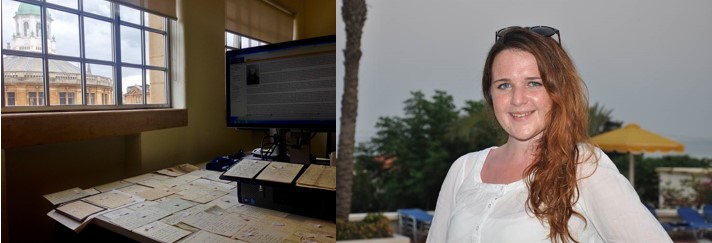 This summer I was lucky enough to have been offered work experience with the archiving department of the Bodleian library, through the university's career service internship programme. The position really appealed to me because, finishing the second year of my History degree, I wanted to learn more about how I could use my studies once I come to the end of my time here at Oxford - plus, it was a great excuse to spend another month here in the city I have come to regard as home. I was working under the supervision of Michael Hughes, a senior archivist in the Western Manuscripts department, based in the (newly re-opened and rather beautiful!) Weston Library, on the Shiela Sokolov Grant project.
This summer I was lucky enough to have been offered work experience with the archiving department of the Bodleian library, through the university's career service internship programme. The position really appealed to me because, finishing the second year of my History degree, I wanted to learn more about how I could use my studies once I come to the end of my time here at Oxford - plus, it was a great excuse to spend another month here in the city I have come to regard as home. I was working under the supervision of Michael Hughes, a senior archivist in the Western Manuscripts department, based in the (newly re-opened and rather beautiful!) Weston Library, on the Shiela Sokolov Grant project.
Shiela Sokolov Grant, perhaps better known by her maiden name Shiela Grant Duff, was a student at Lady Margret Hall in the early 1930s. She went on to become a foreign correspondent in the years leading up to the outbreak of war in 1939, based primarily in Paris and Prague. Shiela's life, in many ways, serves as a microcosm for the experiences of her generation, who grew up as part of the aristocratic class of the inter-war era. It was marked by the tragic loss of her father and brother in successive World Wars, and her attempts to navigate the social fragmentation of a country stretched to its limits by the demands of war time, but also the opportunism of increasing freedom for young females, and the excitement of her involvement with the political elite, both at Oxford and afterwards. She became a staunch and vocal opponent of Chamberlain's appeasement policy, and the Munich Agreement in particular, as her passionate pacifism was replaced by a fear of Nazi expansionism and the horrors that accompanied it. This was best demonstrated in her monograph in defence of the territorial integrity of Czechoslovakia, Europe and the Czechs - the initial royalties of which she relinquished in return for her publishers at Penguin sending a copy to all British MPs. In a somewhat poignant piece of historical irony, it hit the shelves on the same day Chamberlain flew home from Munich.
After Shiela passed away in 2004, her papers were passed to the Bodleian library to be archived, a project that so far has been worked on largely by Michael, and Shiela's daughter Penelope - so I was lucky to have very experienced hands to show me the ropes! My role on the project had two main functions, to help sort, date and order the contents of the files, and to catalogue them on a digital system which will eventually be opened for researchers to access. One of the real perks of the job was being able to handle all of these original historical documents, something you don't always get to do as an undergraduate - although having tried to decipher some of the hand writing, I can perhaps see why... The Sokolov Grant collection is particularly interesting because Shiela maintained correspondence with a number of noted personalities of the time, including Isaiah Berlin, Christopher Hill, David Astor, and the German Rhodes Scholar Adam von Trott, later killed for his involvement in the Stauffenberg bomb plot of 1944. I found the letters of Shiela and Adam fascinating, as the two friends sought to understand the increasing discord between their countries from both sides of the national divide. Indeed, this correspondence has gone on to form the basis for my thesis research, which I hope to build around the theme of youth, gender and national identity in the 1930s.
Although I could go on talking about the history behind these letters and the thrill of getting to hold them for myself for ages, I would really just like to express my gratitude for the generosity of the Annual Fund which enabled me to undertake this internship position. Without the financial grant which helped cover the costs of my daily commute, I simply wouldn't have been able to afford to accept the offer. I feel really privileged that I have been able to make the most of the opportunities offered by Oxford, and that the Brasenose community has been so supportive. I have finished my internship with both an idea for my undergraduate thesis, and a much better idea of the careers open to History graduates - both things which I am sure will be very helpful as I contemplate going into my final year, so thank you!
By Emily Boseley (3rd Year Historian)
The Brasenose Annual Fund, which helped Emily cover the costs of her work experience, exists to fund student research, extracurricular activities, and educational and personal development. The images show Emily, and the view from her office window at the Bodleian.
